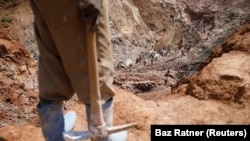Both parties agreed to maintain the current structure of the shareholding, while the Chinese partners, Sinohydro Corp and China Railway Group Limited, will pay 1.2% of royalties annually to DRC, according to a statement.
President Felix Tshisekedi's government had been revisiting the deal struck by his predecessor Joseph Kabila under which the Chinese partners agreed to build roads and hospitals in exchange for a 68% stake in the joint venture with the Central African nation’s mining company Gecamines.
Under the deal, the Chinese investors committed to spending $3 billion on infrastructure projects, but the state auditor - Inspection Generale des Finances, IGF - last year demanded that commitment be increased to $20 billion.
Tshisekedi instructed his government to hold talks with the investors ahead of a visit to China in May 2023. He had aimed to boost DRC’s stake in the joint venture to 70% from 32%.
"It is a win-win deal," IGF head Jules Alingete said in a press conference, adding that negotiations had not been easy.
Ernest Mpararo, head of the DRC’s Anti-Corruption League, said the announcement was a step forward but flagged that Sicomines remained exempt from paying taxes.
Mpararo also pointed to money owed under the last agreement. A 2023 IGF report found that only $822 million of the $3 billion promised for infrastructure investments had been spent.
DRC is the world's biggest producer of cobalt, a key component in batteries for electric cars and mobile phones. It is also the world's third-largest copper producer. Its mining sector is dominated by Chinese companies.
Tshisekedi, who won a second mandate in December, had signposted the agreement in his Jan. 20 inauguration speech.








Forum